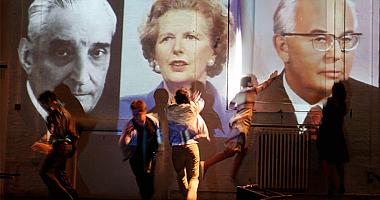MA
Global Politics: Theory & Activism
This programme challenges views on global politics, considering the roles of international civil society, activists and non-Eurocentric understandings of politics. Applying academic knowledge to real-world situations you'll have practical and professional opportunities throughout the degree.
Content navigation menu
Why study MA Global Politics: Theory & Activism at Goldsmiths
- This programme will help you develop critical skills beyond Eurocentric views of international politics. You'll learn to engage with different perspectives, questioning the boundaries between politics, culture, ecology, religion and the economy.
- As you delve into current global issues, you will explore the emergence of new geopolitical powers in the Global South, the widening gap between the rich and the poor, the afterlives of neoliberalism, the influence of feminism in shaping politics, initiatives to revive democracy in the face of populism, the significance of human rights and memory in establishing a fair international system, and the pressing need for sustainable development amid ecological devastation.
- You'll learn about the impact of activism and activists on global politics. You will analyse and critically assess the emergence of new forms of politics and resistance in international politics. The programme will encourage you to think creatively about new forms of political mobilisation and organisation and transformative ideas like "decolonisation".
- You'll be able to work in an interdisciplinary fashion, exploring cutting-edge perspectives in the social sciences while adding critical insights from art, the humanities and cultural studies to your toolbox.
- During the programme, you'll get the chance to innovate and develop your own ideas, research and professional agendas with the support of a team of expert scholars working in diverse fields and regions of study, including Africa, Asia, Latin America and the Middle East, as well as Europe and the USA.
- Through innovative teaching and partnerships, this program aligns academia, activism, politics, and NGOs.
- This programme benefits from the active research agendas of three research centres: the Centre for Postcolonial Studies, the Political Economy Research Centre (PERC) and the Centre for the Study of the Balkans.
Contact the department
If you have specific questions about the degree, contact Francisco Carballo.
Length
1 year full-time, 2 years part-time
Fees
Home - full-time: £TBCHome - part-time: £TBC
International - full-time: £TBC
Department
What you'll study
The programme is structured to balance academic, theoretical approaches with practical, real-world offerings. During your degree, you'll need to complete 180 credits in total.
During your first term you'll study the following compulsory module:
| Module title | Credits |
|---|---|
| Rethinking the International | 15 credits |
You'll choose one module from the practice-based and vocational options provided:
| Module title | Credits |
|---|---|
| Political Research, Activism, Enterprise | 30 credits |
| or | |
| Designing politics (group project) | 30 credits |
Or choose a practice-based module worth 30 credits from another department from a list provided. Please note, your module may continue into Term 2 of the programme.
You'll also choose 60 credits of options from a wide range of modules available through the Department of Politics and International Relations and other academic departments at Goldsmiths, including History, Sociology, Media and Communications, and Anthropology to be taken across Term 1 and 2.
Please note that due to staff research commitments not all of these modules may be available every year.
Note about optional modules (if available): The above is indicative of the typical modules offered, but is not intended to be construed or relied on as a definitive list of what might be available in any given year. The module content and availability is subject to change.
Teaching style
You'll learn via a range of teaching and learning methods including seminars, practical and experiential learning, industry workshops, placements, original research and independent study.
Assessment
Assessment consists of a range of methods including: coursework, extended essays, reports, presentations, practice-based projects or essays/logs, group projects, and reflective essays.
Entry requirements
Applicants should hold a minimum of a second-class Bachelor's degree from a UK or overseas institution of equal standing. Individuals from any academic background are welcome to apply, though those with degrees in social sciences or humanities (e.g., politics, economics, sociology, anthropology, social work, history, cultural studies, visual cultures, or journalism) may have an advantage.
However, we may also consider applicants without a relevant academic background if they have professional experience in the field or can demonstrate their ability to succeed at this level of study.
International qualifications
Non-native English speakers must have a minimum IELTS score of 6.5 or equivalent.
Fees and funding
Annual tuition fees
These are the PG fees for students starting their programme in the 2024/2025 academic year.
- Home - full-time: £TBC
- Home - part-time: £TBC
- International - full-time: £TBC
If your fees are not listed here, please check our postgraduate fees guidance or contact the Fees Office, who can also advise you about how to pay your fees.
It’s not currently possible for international students to study part-time under a student visa. If you think you might be eligible to study part-time while being on another visa type, please contact our Admissions Team for more information.
If you are looking to pay your fees please see our guide to making a payment.
Funding opportunities
Find out more about postgraduate fees and explore funding opportunities. If you're applying for funding, you may be subject to an application deadline.
Additional costs
In addition to your tuition fees, you'll be responsible for any additional costs associated with your course, such as buying stationery and paying for photocopying. You can find out more about what you need to budget for on our study costs page.
There may also be specific additional costs associated with your programme. This can include things like paying for field trips or specialist materials for your assignments. Please check the programme specification for more information.



